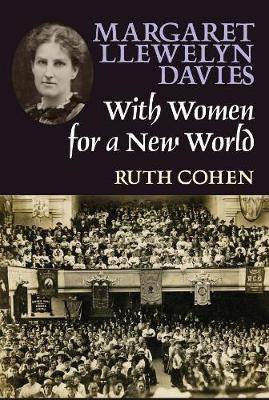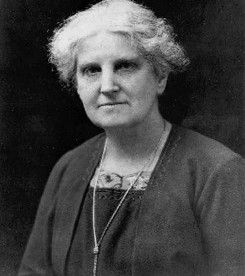Margaret Llewelyn Davies: With women for a new world; Ruth Cohen, (Merlin Press, £17.99)
Merlin, the publishers of Ruth Cohen’s new biography of Margaret Llewelyn Davies, have chosen for her book’s cover one of those set-piece old photos taken of delegates at an annual co-operative conference. Row after row of delegates look back at the camera from the packed stalls and the equally packed gallery of the civic hall where the event was taking place.

At a guess, we are at a conference in the early twentieth century, or just possibly very late in the nineteenth.
Pretty well every annual Co-operative Congress of the time seems to have been recorded in photos just like this one. Year after year the packed rows of male delegates can be seen, there to represent their local societies and to attend to the business in hand.
But there’s something very different about the photo on Ruth Cohen’s book. With the exception of a solitary man just visible at the back of the gallery, every single one of the hundreds of delegates in this particular image is a woman.
This is a photographic record, in other words, not of one of the Co-operative Union’s Congresses, but of one of the parallel national Congresses held each year from the early 1890s by the Women’s Co-operative Guild. These events, typically held over several days, brought together hundreds of primarily working-class women for speeches, debates and socialising – as well as, often, for launching campaigns to persuade the male part of the co-op movement to adopt rather more radical policies. It can be argued that, if the CWS was the great commercial achievement of the early co-op movement, the WCG was the great social achievement – but sadly the Guild has too often been dismissed as simply ‘auxiliary’ by the mainstream co-op world.

The WCG was led from 1889 for 30 years by Margaret Llewelyn Davies and was the organisation to which she dedicated a very large part of her life, so Ruth Cohen’s biography of her is exceptionally welcome. As Ruth points out, her work is the first full-length biography, and perhaps for a reason: “The fact that she left few private papers seemed, initially, an insurmountable obstacle… I worried that a lack of personal information would make for a very one-dimensional picture,” she writes in her introduction.
It is certainly highly disappointing, if not surprising, that nobody apparently thought Margaret Llewelyn Davies’ papers worth archiving after her death in 1944. Fortunately Ruth Cohen knows her trade well enough as a historian to unearth a wide range of other material to build up a very well-rounded picture of her subject. And Margaret Llewelyn Davies certainly emerges as a fascinating woman.
Her family background was upper middle-class, but strongly liberal and progressive. As Ruth Cohen explains, Margaret’s father (a clergyman) was associated with FD Maurice and the Christian Socialists, the school of progressive theology closely linked to the co-op movement, particularly in London. One of her father’s sisters was a co-founder of Girton College, the Cambridge college for women which Margaret herself later attended. One of Margaret’s other aunts married Spencer Beasley, active with Karl Marx in the founding of the ‘First International’. George Eliot was a close neighbour in the Marylebone area of London where Margaret was growing up. In other words, Margaret came from a privileged background but one which was immersed in all kinds of social reform issues. ‘A potent mix,’ is Ruth Cohen’s verdict.
Margaret Llewelyn Davies’ time at Girton was curtailed after only two years, perhaps because her mother needed her only daughter back to help manage the household in Marylebone. It was the Marylebone branch of the WCG which Margaret joined in late 1886, rapidly being elected as branch secretary. In 1888, in her late twenties, she was elected to the Guild’s central committee. A year later, in 1889, she was to be invited to take over as the Guild’s general secretary. So began a period of extraordinary expansion of the Guild, both in numbers and in the work it undertook. “It offered education, experience and practical training, but much more; a very special sort of friendship, support and solidarity. Perhaps ‘empowerment’ comes nearest,” Ruth Cohen suggests.
Bizarrely, Margaret Llewelyn Davies was overseeing this growth from the small town of Kirkby Lonsdale, then in Westmorland and now in Cumbria. Her father had moved from London to take over the parish there in 1889 and his daughter was obliged to follow too, to what she clearly saw as a kind of exile. For almost two decades the Guild’s business was run from a large upstairs room in the vicarage. Only in 1909 did Margaret and her elderly father return to London.
By then the Guild’s membership was in the tens of thousands, ‘a unique and even exciting regiment of women whose energy and vitality were exhilarating’, as Leonard Woolf said at the time. Ruth Cohen steers us through some of the major campaigns which the Guild engaged in under Margaret’s leadership, including those around maternity rights, women’s health, equal pay and children’s health. There is also an account of the notorious dispute in 1914 between the Guild and the Co-operative Union after the Guild had dared to campaign around divorce. The Union, under pressure from conservative co-operators, withdrew the Guild’s £400 grant for a number of years.
Margaret stepped down as WCG general secretary in 1921 on health grounds. At the same time Lilian Harris, formally the Guild’s assistant secretary but also Margaret’s life companion, announced that she was also retiring. Margaret remained unmarried throughout her life and she and Lilian lived together for over 25 years from 1918 until Margaret’s death. Ruth Cohen advises against necessarily immediately assuming that their close friendship was a lesbian one, but says that they became ‘devoted companions’. “More than this we cannot know”, she concludes.
Margaret Llewelyn Davies was much more than a leading co-operator of her time. She was a socialist with a strong commitment to trade unionism and a lifelong fighter for women’s rights. She also became, in the years after the First World War, a tireless campaigner for pacifism. Her story is an important one, and Ruth Cohen’s biography is a significant contribution both to co-operative history and to women’s history.